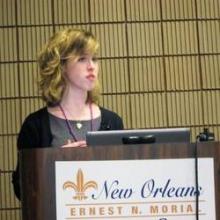NEW ORLEANS – The Delirium Observation Screening Scale is easy, fast, and accurate when performed by a bedside nurse in elderly hospitalized patients, according to results of a validation study.
The purely observational screening tool requires no cognitive testing or additional education for nursing staff and typically takes 2-3 minutes to complete, Katie Gavinski, a medical student at the University of Iowa, Iowa City, said at the annual meeting of the American Academy of Hospice and Palliative Medicine.
The DOSS includes 13 yes/no questions, such as whether the patient maintains attention to a conversation or action or knows which part of the day it is. A score of 15 or more is considered positive for delirium. The DOSS was developed and validated in the Netherlands but had not been validated in the United States in an elderly patient population, she said.
To accomplish this, the investigators compared results in the medical records of 54 elderly patients in a general medicine inpatient unit from twice-daily screening with the DOSS and those prospectively obtained using the 16-item, clinician-rated Delirium Rating Scale-Revised-98 (DRS-R-98).
A total of 100 delirium assessments were performed in the 54 patients, whose average age was 77 years; 40% were male.
In all, 83 tests were negative for delirium and 17 were positive. There was one false-negative test and 8 false-positive results, of which seven were in patients considered in sub-syndromal delirium based on a DRS-R-98 score of 8-14, Ms. Gavinski reported.
Thus, sensitivity was 90% and specificity 91%.
Positive DRS-R-98 screens were significantly correlated with positive DOSS screens for delirium, she said.
Senior author and colleague Dr. Michelle Weckmann, also of the University of Iowa, said that the DOSS is not designed to be used by physicians but appears to be a powerful tool in the hands of nurses.
"Routine implementation of the DOSS on hospital units has the potential to increase identification of delirium with minimal use of hospital resources, and improved identification of delirium has the potential to significantly improve patient care and outcomes," she said in an interview.
E-mail surveys from 98 adult-unit nurses revealed that 87% were confident performing the DOSS and 91% said that they could complete it in less than 3 minutes.
Only about 30% of the nurses, however, agreed or strongly agreed that the DOSS provided valuable information for the treatment of their patients or enhanced patient care, Ms. Gavinski said.
"The biggest thing nursing staff called for was additional education," she said. "They understood how to do it and that they would get a positive result for delirium, but didn’t know what to do with that result."
As a result of the study, the DOSS has been integrated into all adult units, and about 98% of patients over the age of 64 are now being screened with the DOSS at least once during their hospitalization. A delirium order set also was developed to address the question of what to do next if a screen is positive. Future research will evaluate whether delirium screening with the DOSS improves the outcomes of patients who test positive, Ms. Gavinski said.
During a discussion of the study, she noted that the 2 a.m. and 2 p.m. screening times used in the study were selected arbitrarily and that the test can be completed whenever nurses interact with their patients. Also, the DOSS does not specifically measure delirium severity, whereas the DRS-R-98 has 13 severity items and 3 diagnostic items.
Ms. Gavinski and her coauthors reported no relevant disclosures.


